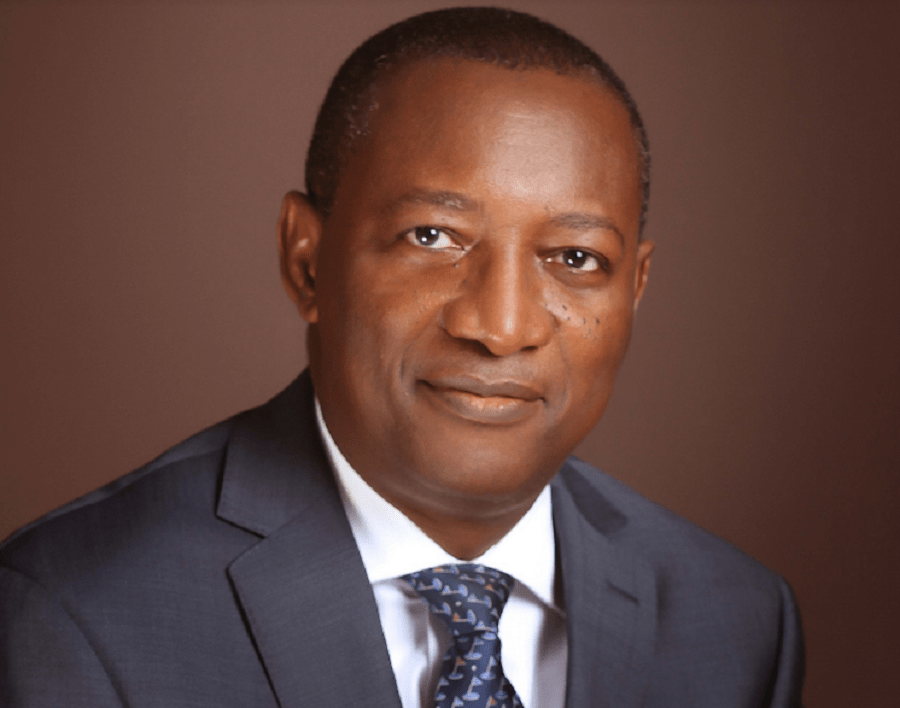Business
Government must play a major role for the mortgage sector to thrive – CEO, Abbey Mortgage Bank

The Managing Director/CEO of Abbey Mortgage Bank has given an overview of the mortgage bank industry in Nigeria, what inspired the establishment of Abbey Mortgage Bank, and the challenges encountered on the way.
Speaking during the Nairametrics’ Business Half Hour, Madu Haman gave a brief background of his journey into the financial industry.
“I graduated from the university in 1982, started my banking career in 1984 with the then Bank of Credit & Commerce, which was later converted to African International Bank (Afribank). In 1990, I joined the merchant bank now called the New World Merchant Bank. Then in 1992, I left New World Merchant Bank to join Abbey Building Society, which is now Abbey Mortgage Bank,” he said.
According to Mr. Madu, what motivated the establishment of Abbey Mortgage Bank was the Mortgage Institution Act that was enacted in 1989. It was an opportunity to provide housing finance to Nigerians. So, in 1992, they got licensed and since then, the business has grown.
He continued by saying that currently, their aim is to replicate in Nigeria what is obtainable in a more developed economy like the UK, where housing finance is affordable and available to everyone.
During the session, he stated that nothing came easy, especially when it came to establishing a business, so, they had their pitfalls during inception though they were able to scale through, with the help of the initial promoters who had experience in banking.
Speaking about funding, Mr. Madu noted that their initial capital when they started in 1992 was N5,000,000, which the promoters were able to gather from friends. Since then, they have gradually been increasing the capital. In 2005, they became a public limited liability company and got listed on the Nigerian Stock Exchange in 2008, which gave them a wider market for raising capital.
Abbey Mortgage Bank, according to Madu, is in partnership with private sector providers, most of whom are real estate developers who provide the houses for them to grant mortgages on. He noted that the partnership is with credible developers, who have the type of houses that meet the requirement of customers. The bank is also in partnership with notable cooperatives, whose members want to access housing finance.
According to him, Nigeria’s patronage of mortgage banks is very low. He said even at the African level, Nigeria is way below when it comes to a mortgage. He stated that currently, the mortgage sector constitutes just about 2.5% of our GDP compared to the United Kingdom where the contribution is 80%, while South Africa contributes 50% to 60% of their GDP, and Ghana has close to 30% GDP contribution. In other words, Nigeria needs to step up her game when in the mortgage sector.
He said for this to be feasible, the Government has a major role to play in terms of providing the right environment for the mortgage sector to thrive. Speaking further, he said there are many challenges that affect the mortgage sector, most of which have to do with the government. For example, the Land Use Act, which makes the process of land acquisition very difficult and expensive. Speaking further, he stated that what made land acquisition difficult are the processes one must undergo, such as:
1. The process of getting the Governor’s consent
2. The bureaucratic process of registering the mortgage
3. The cost of registration being exorbitant.
During the session, Haman noted that the government could assist in reducing some of these challenges. The plan to address the various challenges facing the mortgage sector started as far back as 2001 when the then President, Olusegun Obasanjo, formed a presidential committee to review the legal framework around the mortgage sector, especially amending the Land Use Act and other issues concerning the smooth operation of the mortgage sector.
However, before the approval of such an amendment, another government took over which automatically led to starting the process all over.
Furthermore, he said they had to establish an advocacy association for the mortgage Industry called the Mortgage Banking Association of Nigeria and their work is to take care of these issues that the mortgage sector is facing. He said they also have other institutions, like the Nigerian Mortgage Finance Company, which is partly owned by the participating banks and partly owned by the Federal Government (the Federal Ministry of Finance and CBN are also involved). The role of this institution is advocacy, i.e., trying to address the challenges facing the mortgage sector.
Also, they have been talking to state governors to see how each state can amend some of their laws to make it easier and smoother for mortgage sectors. However, he noted that some states like Lagos and Kaduna have been very cooperative. More so, the engagement continues with various other states that are willing to participate in the provision of housing for their citizens.
Additionally, he clarified the issues some Nigerians encounter when it comes to accessing NHF loans. He said the Federal Mortgage Bank is a custodian of the National Housing Fund, so for a contributor to be able to access facilities from the National Housing Fund, they must approach a primary mortgage bank which then processes their request and forwards it to the Federal Mortgage Bank for approval. He added that before NHF can give out a loan, it will have to check out the following:
· The property involved.
· Does it have a proper title?
· What is the applicant’s source of income?
· Would he be able to meet the repayment of the loan?
All these processes are done at the primary mortgage bank-level before being forwarded to the Federal Mortgage Bank for approval, and then the Federal Mortgage Bank also goes through its own process of checking. With all these processes, one might look at the loan request as a difficult one, however, the rate at which you get the facilities is only 6% which is the lowest facility you can get in the Nigerian market right now.
In conclusion, he said that Abbey has a very good pedigree, and they been in the market for almost 29 years now. He continued by saying that Abbey mortgage bank is presently the oldest and the largest mortgage bank in Nigeria and they are currently doing the Right Issues which was opened on the 4th of January for their existing shareholders to invest more on.
Business
Nigeria’s Inflation Drops to 15.10% as NBS Reports Deflationary Trend

Nigeria’s headline inflation rate declined to 15.10 per cent in January 2026, marking a significant drop from 27.61 per cent recorded in January 2025, according to the latest Consumer Price Index (CPI) report released by the National Bureau of Statistics.
The report also showed that month-on-month inflation recorded a deflationary trend of –2.88 per cent, representing a 3.42 percentage-point decrease compared to December 2025. Analysts say the development signals easing price pressures across key sectors of the economy.
Food inflation stood at 8.89 per cent year-on-year, down from 29.63 per cent in January 2025. On a month-on-month basis, food prices declined by 6.02 per cent, reflecting lower costs in several staple commodities.
The data suggests a sustained downward trajectory in inflation over the past 12 months, pointing to improving macroeconomic stability.
The administration of President Bola Ahmed Tinubu has consistently attributed recent economic adjustments to ongoing fiscal and monetary reforms aimed at stabilising prices, boosting agricultural output, and strengthening domestic supply chains.
Economic analysts note that while the latest figures indicate progress, sustaining the downward trend will depend on continued policy discipline, exchange rate stability, and improvements in food production and distribution.
The January report provides one of the clearest indications yet that inflationary pressures, which surged in early 2025, may be moderating.
Bank
Alpha Morgan to Host 19th Economic Review Webinar

Alpha Morgan to Host 19th Economic Review Webinar
In an economy shaped by constant shifts, the edge often belongs to those with the right information.
On Wednesday, February 25, 2026, Alpha Morgan Bank will host the 19th edition of its Economic Review Webinar, a high-level thought leadership session designed to equip businesses, investors, and individuals with timely financial and economic insight.
The session, which will hold live on Zoom at 10:00am WAT and will feature economist Bismarck Rewane, who will examine the key signals influencing Nigeria’s economic direction in 2026, including policy trends, market movements, and global developments shaping the local landscape.
With a consistent track record of delivering clarity in uncertain times, the Alpha Morgan Economic Review continues to provide practical context for decision-making in a dynamic environment.
Registration for the 19th Alpha Morgan Economic Review is free and can be completed via https://bit.ly/registeramerseries19
It is a bi-monthly platform that is open to the public and is held virtually.
Visit www.alphamorganbank to know more.
Business
GTBank Launches Quick Airtime Loan at 2.95%

GTBank Launches Quick Airtime Loan at 2.95%
Guaranty Trust Bank Ltd (GTBank), the flagship banking franchise of GTCO Plc, Africa’s leading financial services group, today announced the launch of Quick Airtime Loan, an innovative digital solution that gives customers instant access to airtime when they run out of call credit and have limited funds in their bank accounts, ensuring customers can stay connected when it matters most.
In today’s always-on world, running out of airtime is more than a minor inconvenience. It can mean missed opportunities, disrupted plans, and lost connections, often at the very moment when funds are tight, and options are limited. Quick Airtime Loan was created to solve this problem, offering customers instant access to airtime on credit, directly from their bank. With Quick Airtime Loan, eligible GTBank customers can access from ₦100 and up to ₦10,000 by dialing *737*90#. Available across all major mobile networks in Nigeria, the service will soon expand to include data loans, further strengthening its proposition as a reliable on-demand platform.
For years, the airtime credit market has been dominated by Telcos, where charges for this service are at 15%. GTBank is now changing the narrative by offering a customer-centric, bank-led digital alternative priced at 2.95%. Built on transparency, convenience and affordability, Quick Airtime Loan has the potential to broaden access to airtime, deliver meaningful cost savings for millions of Nigerians, and redefine how financial services show up in everyday life, not just in banking moments.
Commenting on the product launch, Miriam Olusanya, Managing Director of Guaranty Trust Bank Ltd, said: “Quick Airtime Loan reflects GTBank’s continued focus on delivering digital solutions that are relevant, accessible, and built around real customer needs. The solution underscores the power of a connected financial ecosystem, combining GTBank’s digital reach and lending expertise with the capabilities of HabariPay to deliver a smooth, end-to-end experience. By leveraging unique strengths across the Group, we are able to accelerate innovation, strengthen execution, and deliver a more integrated customer experience across all our service channels.”
Importantly, Quick Airtime Loan highlights GTCO’s evolution as a fully diversified financial services group. Leveraging HabariPay’s Squad, the solution reinforces the Group’s ecosystem proposition by bringing together banking, payment technology, and digital channels to deliver intuitive, one-stop experiences for customers.
With this new product launch, Guaranty Trust Bank is extending its legacy of pioneering digital-first solutions that have redefined customer access to financial services across the industry, building on the proven strength of its widely adopted QuickCredit offering and the convenience of the Bank’s iconic *737# USSD Banking platform.
About Guaranty Trust Bank
Guaranty Trust Bank (GTBank) is the flagship banking franchise of GTCO Plc, a leading financial services group with a strong presence across Africa and the United Kingdom. The Bank is widely recognized for its leadership in digital banking, customer experience, and innovative financial solutions that deliver value to individuals, businesses, and communities.
About HabariPay
HabariPay is the payments fintech subsidiary of GTCO Plc, focused on enabling fast, secure, and accessible digital payments for individuals and businesses. By integrating payments and digital technology, HabariPay supports innovative services that make everyday financial interactions simpler and more seamless.
Enquiries:
GTCO
Group Corporate Communication
[email protected]
+234-1-2715227
www.gtcoplc.com
-

 celebrity radar - gossips6 months ago
celebrity radar - gossips6 months agoWhy Babangida’s Hilltop Home Became Nigeria’s Political “Mecca”
-

 society6 months ago
society6 months agoPower is a Loan, Not a Possession: The Sacred Duty of Planting People
-

 society5 months ago
society5 months agoReligion: Africa’s Oldest Weapon of Enslavement and the Forgotten Truth
-

 news6 months ago
news6 months agoTHE APPOINTMENT OF WASIU AYINDE BY THE FEDERAL GOVERNMENT AS AN AMBASSADOR SOUNDS EMBARRASSING









